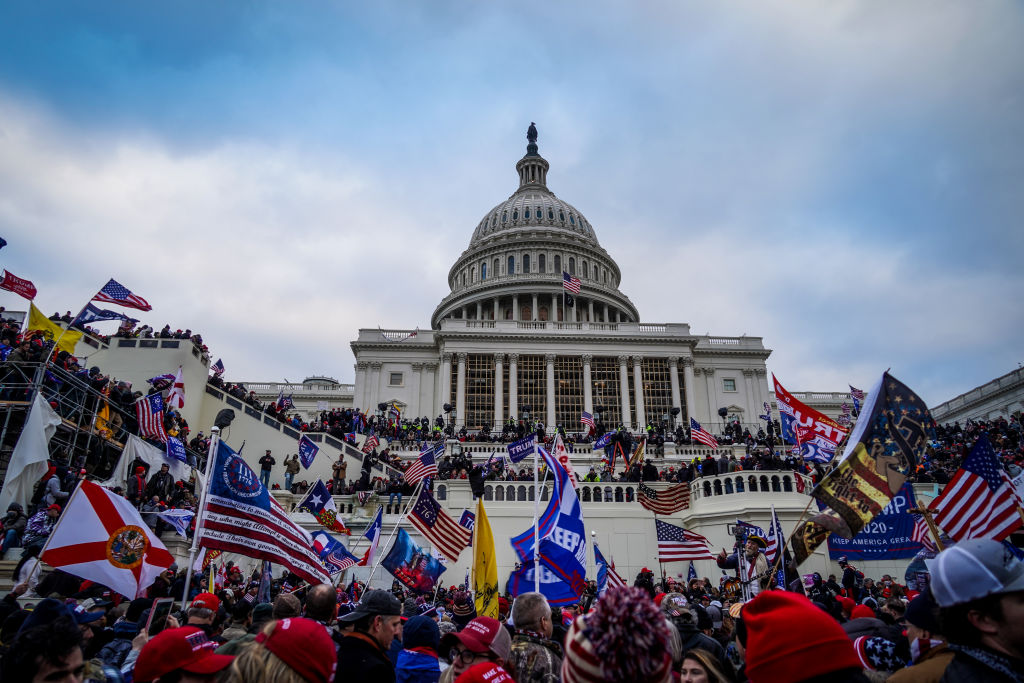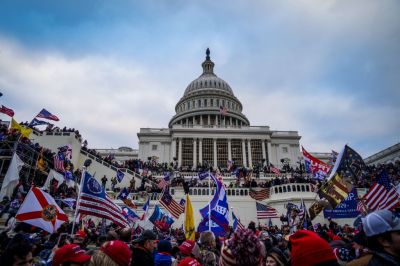There was a time when Donald Trump was almost melancholy about the January 6, 2021, violent ransacking of the Capitol by his most fervent grassroots supporters—hard as that is to believe now, given his whitewashing of the events of that day and zealous defense of the culprits.
The former president has shifted from lamenting January 6, to hinting that conspiracies were behind the civil unrest that unfolded on that day, to questioning the response of law enforcement, to both-sides’ing the actions of the rioters and law enforcement, to ignoring the riot as though it never happened, and finally, to lionizing the rioters as unjustly persecuted freedom fighters.
I know, because I interviewed him for my book, In Trump’s Shadow: The Battle for 2024 and the Future of the GOP, on May 5, 2021. That was just four months after the ignominious attack intended to block Congress from certifying Joe Biden’s 2020 Electoral College victory and extend Trump’s presidency despite his loss. As Trump and I chatted about January 6 on that day, he seemed genuinely sorry it happened.
At the very least, Trump recognized that what happened was bad, and that the perpetrators were indeed perpetrators who had behaved badly, if not committed crimes.
“I was not surprised that they went down to the Capitol to cheer. But I was surprised that they went [into] the Capitol. And the relationship with the police, and these people—the Capitol police and these people—was a very good relationship,” Trump told me inside one of the ornate dining rooms at Mar-a-Lago, his winter residence and private social club in Palm Beach, Florida.
“I wanted to go down there and the Secret Service just wouldn’t let me,” Trump said. He noted he had spoken to the crowd earlier that day near the White House from behind bulletproof glass, explaining that the Secret Service put the kibosh on him appearing at the Capitol because agents had security concerns. Trump continued: “I think if I did go down there, I would have stopped the people from doing anything bad.” (emphasis mine.)
The most Trump said in that conversation to deflect blame for the riot was to insinuate that “some” Black Lives Matter and antifa infiltrators were also involved.
That was then.
But by July 2021, right around the time I hit the final deadline for my manuscript, Trump had dispensed with any and all acknowledgements that January 6 was, well, what it was.
“Who shot Ashli Babbitt? Why are they keeping that a secret? Who is the person that shot an innocent, wonderful, incredible woman—a military woman—right in the head? And, there’s no repercussions?” Trump said, in an interview with Fox Business Network’s Maria Bartiromo. “You have people with no guns, that walked down, and frankly the doors were open and the police in many cases, you know, they have hundreds of hours of tape and they’re’ not releasing the tape. … There was also a lovefest between the police, the Capitol Police, and the people that walked down to the Capitol.”
Video evidence plainly revealed the events of January 6, 2021, amounted to a violent attack on the Capitol by Trump’s grassroots supporters for the purpose of overturning an election the 45th president had assured them was criminally stolen. Federal authorities estimated property damage approaching $3 million and reported injuries to more than 100 U.S. Capitol Police officers. According to the New York Times, 65 officers of Washington’s Metropolitan Police Department also were injured.
Even some within Trump’s own administration viewed the day as catastrophic.
On Friday, January 8, 2021, Secretary of State Mike Pompeo tweeted a picture of himself in discussion with National Security Adviser Robert C. O’Brien and Director of National Intelligence John Ratcliffe. The point, well-placed sources explained to me for In Trump’s Shadow, was to send a message to U.S. allies and adversaries abroad that the senior administration officials had a firm hand on the command and control of Washington’s national security apparatus.
Meanwhile, some members of Trump’s Cabinet considered invoking the 25th Amendment, a constitutional means to replace an incapacitated president from office, while some senior administration officials resigned. Those who quit in the wake included Education Secretary Betsy DeVos; Transportation Secretary Elaine Chao; Special Envoy to Northern Ireland and former acting White House Chief of Staff Mick Mulvaney, among others.
Since Trump’s interview with me at Mar-a-Lago on May 5, 2021, he has increasingly defended, and bear-hugged, the people charged and convicted of criminal activity in relation to the January 6 attack on the Capitol. The former president regularly refers to them as “J-6 patriots,” and “hostages,” and “political prisoners.”
For instance, in a September 2, 2021, radio interview reported by the Independent, Trump said he had recently met with January 6 defendants and claimed he was helping to pay their legal bills. The 45th president described them as “firemen, they’re police men, they’re people in the military,” while describing federal prosecutors bringing charges against them as “sick radical leftists.”
In December 2022, roughly two weeks after launching his 2024 presidential bid, CNN reported that Trump filmed a video for a fundraiser hosted by Patriot Freedom Project, a group that provided financial assistance to families whose relatives were facing criminal charges related to January 6. “People have been treated unconstitutionally in my opinion and very, very unfairly, and we’re going to get to the bottom of it,” Trump said in the video.
In March 2023, as the race for the Republican presidential nomination was getting underway, Trump again lent his bully pulpit to the January 6 defendants—something his GOP opponents were pointedly avoiding. “What they’ve done to these people, they’ve persecuted these people. Trump said, during a televised town hall hosted by CNN. “They’re living in hell right now.”
Trump has continued to issue similar statements, both planned and extemporaneous, ever since—including after he effectively won the GOP’s 2024 nomination and pivoted to the general election rematch with Biden. The presumptive Republican nominee also has given January 6 defendants prominent and favorable attention at his campaign rallies, playing recordings of the “J6 Prison Choir” singing the national anthem.
This despite at least 730 guilty pleas from the more than 1,300 people charged with criminal offenses, according to the Associated Press. Some Republican insiders who have followed Trump’s rise and takeover of the GOP explain his initial concession that the January 6 rioters acted malevolently as, per one GOP strategist I spoke with: “an insincere, half-executed survival tactic.”
Indeed, as the heat on Trump over January 6 intensified, the former president dug in deeper on his defense of the January 6 defendants. He was not dissuaded, not by the exhaustive probe by the House Select Committee to Investigate the January 6 Attack on the United States Capitol, nor the multiple criminal indictments—including federal charges related to an alleged scheme to overturn the 2020 election.
At least for now, Trump’s journey from the rioters' critic to superfan has culminated in him telling Time magazine he would “absolutely” be open to pardoning all of the January 6 convicts. His campaign later clarified in comments to NBC News, saying presidential pardons would be considered individually. “As President Trump has promised, he will pardon January 6 protestors who are wrongfully imprisoned by Crooked Joe Biden’s Justice Department, and those decisions will be determined on a case-by-case basis,” Trump campaign spokeswoman Karoline Leavitt said.
For Trump’s Republican critics, his behavior is easily explained.
“He’s trying to justify his own behavior and that of his followers on January 6,” a GOP operative who opposes the former president said. “He thinks the behavior was okay because they bought into his fantasy that he won 2020.”






Please note that we at The Dispatch hold ourselves, our work, and our commenters to a higher standard than other places on the internet. We welcome comments that foster genuine debate or discussion—including comments critical of us or our work—but responses that include ad hominem attacks on fellow Dispatch members or are intended to stoke fear and anger may be moderated.
With your membership, you only have the ability to comment on The Morning Dispatch articles. Consider upgrading to join the conversation everywhere.